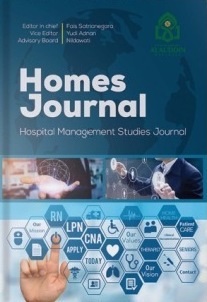IMPLEMENTATION OF SERVICE MANAGEMENT BASED ON MAQASHID SHARIA AT HOSPITAL X
Abstract
Backround: Islamic hospitals are hospitals where the running program refers to maqashid ash-shariah which is the goal of health services in all aspects and forms of activity both in the field of management or services in terms of medical and nursing care framed and aimed at the intentions of the Islamic sharia.
Objective: The purpose of this study was to determine the level of success of Service Management Implementation activities based on Shariah Principles at Hospital X.
Methods: The type of research conducted is qualitative research where the method used is the interview method. Informants in this study are part of the hospital management structure and patients who get services at Hospital X.
Results: The results found that in terms of Maqasyid Sharia, Hospital X has carried out treatment procedures by applying sharia standards that apply to staff and all patients, starting from the preservation of religion, soul, mind, offspring, to property.
Conslusion: Safeguarding Religion, Safeguarding the Spirit, Safeguarding the Intellect, Protecting the Offspring, and Safeguarding the Property, they have met sharia standards.
References
Ali, I. Q. (2018). Analisis Pengaruh Maqashid Syariah Dalam Pelayanan Terhadap Maslahah Pasien (Studi Pada Rumah Sakit Islam Sultan Agung Semarang). Thesis. Universitas Brawijaya.
Anggraeni, F. S. (2020). Kinerja keuangan rumah sakit syariah:pendekatan Maqashid Syariah Concordance (MSC). Imanensi: Jurnal Ekonomi, Manajemen, Dan Akuntansi Islam, 5(2), 1-4.
Arifin, Z., & Rizaldy, M. (2023). Reslaj : Religion Education Social Laa Roiba Journal Sarjanawiyata Tamansiswa Reslaj : Religion Education Social Laa Roiba Journal. Reslaj : Religion Education Social Laa Roiba Journal, 5(1), 168–184.
Attum, B., Hafiz, S., Malik, A., & Shamoon, Z. (2018). Cultural competence in the care of Muslim patients and their families. Treasure Island (FL): StatPearls Publishing; 2024 Jan-. Available from: https://www.ncbi.nlm.nih.gov/books/NBK499933/
Kadir, N. H., Kefeli, Z., & Mohamed, Z. A. (2019). Adoption of Shariah-Based and Muslim Friendly Practices: A Case Study of Selected Medical Tourism Hospitals in Malaysia. MY A. Basah, SA Hamid, NH Hashim, N. Ahmad, & Z. Kefeli@ Zulkefli (Eds.), Sustainable Social and Economic Well-Being, 2019, 391–408.
Karimullah, S. S. (2023). Exploration of Maqasid Al-Shariah Concepts in the Development of Islamic Economic Policies. Mu’amalah: Jurnal Hukum Ekonomi Syariah, 2(2), 153–172.
Kementrian Agama RI. (2022). Qur’an Kemenag.https://quran.kemenag.go.id/quran/per-ayat/surah/5?from=2&to=2
Kusuma, T. S., & Al Awwaly, K. U. (2023). Manajemen Sistem Penjaminan Produk Halal Instalasi Gizi Rumah Sakit. Universitas Brawijaya Press.
Laldin, M. A., Abdul-Kader, S. Z. S., & Djafri, F. (2021). Waqf development in Malaysia. In Waqf Development and Innovation (pp. 207–225). Routledge.
Maghfirah, M. (2023). The Relationship Between Career Women and Its Effects on Achieving Family Harmony with Maqashid Shariah Framework. European Journal of Studies in Management & Business, 28.
Maksum, M., Wahyuni, A., Farida, A. R., Hasanah, L., & Fuad, S. (2022). Sharia service as an added value: response to sharia standard in hospital service. Samarah: Jurnal Hukum Keluarga Dan Hukum Islam, 6(1), 423–448.
Malik, M. (2015). Al-Maqasid Al-Shariah (the Comprehensive Objective of Shari’ah). Paper Dipresentasikan Pada Penang Institute-G25 Forum “Maqasid Syariah in a Constitutional Democracy, 31.
Monzur-E-Elahi, M. (2012). The Objectives and Intents of Islamic Shari’ah As a Paradigm of Development Strategies and Policies. IIUC Studies, 7(December), 321–336. https://doi.org/10.3329/iiucs.v7i0.12496
Nikmah, S. (2019). Konsep Rumah Sakit Syariah dan Implementasinya di Rumah Sakit Muhammadiyah Lamongan [Universitas Islam Negeri Sunan Ampel Surabaya].
Patuti, A. (2020). Praktek Khitan Perempuan di Wihdatul Ummah Medical Center Studi Analisis Maṣlaḥaḥ [Universitas Islam Negeri Alauddin Makassar]. https://repositori.uinalauddin.ac.id/20642/
Qorib, A., Siregar, S., & Nasution, S. D. (2021). Analysis Influence of Information Technology on Financial Transparency BAZNAS in Sharia Maqashid Perspective. Islam Universalia: International Journal of Islamic Studies and Social Sciences, 2(3).
Rachmawati, E. (2019). Islamic-based organization in Indonesia: role of Muhammadiyah in health improvement. International Conference on Social Determinants of Health, 44–51.
Rahmanto, M., Ab Rahman, A., & Daud, Z. M. (2023). Healthcare Waqf And Socio-Economic Development In Indonesia: Case Study Of Hospital Roemani Muhammadiyah. Jurnal Syariah, 31(3), 218–261.
Ratnawati, A., & Kholis, N. (2020). Measuring the service quality of BPJS health in Indonesia: a sharia perspective. Journal of Islamic Marketing, 11(4), 1019–1042.
Rulyandari, R., Djannah, S. N., & Tukiyo, I. W. (2020). Persepsi Masyarakat Terhadap Kebutuhan Pelayanan Rumah Sakit Syariah Di Kota Yogyakarta. Afiasi : Jurnal Kesehatan Masyarakat, 5(3),153–161. https://doi.org/10.31943/afiasi.v5i3.114
Shariff, S. M., & Karim, N. A. (2022). The Practice of Islamic Philanthropy at a Shari’ah Compliant Private Hospital in Malaysia: Issues and Challenges. World Halal Summit. Compliant-Private-Hospital-in-Malaysia-Issues-and Challenges.pdf
Shariff, S. M., Mohtar, S., & Jamaludin, R. (2018). A practical journey in implementing a Shari’ah compliant hospital: An Nur Specialist Hospital’s experience. IIUM Medical Journal Malaysia, 17(2).
Siti, N. (2021). Manajemen Dakwah Rumah Sakit Siaga Medika Purbalingga dalam Melayani Pasien. IAIN Purwokerto.
Sulistiadi, W. S., & Rahayu, S. R. (2017). Potensi Penerapan Maqashid Syariah Dalam Rumah Sakit Syariah Di Indonesia. Proceeding IAIN Batusangkar, 1(1), 683–690.
Sulistyowati, A. D., Handayani, S., & Nursanti, K. (2019). Gambaran Pelaksanaan Indikator Mutu Syariah Perawat Di Rumah Sakit Islam Yogyakarta PDHI. Jurnal kepemimpinan dan manajemen keperawatan, 2(1), 1–8.
Susanti, S., Baehaqi, A., & Firman, M. A. (2021). Analisis Penerapan Akuntansi Lingkungan pada Rumah Sakit Umum Haji Surabaya Dalam Pandangan Maqashid Syariah. Jurnal Akuntansi Dan Keuangan Islam, 9(2), 91–111. https://journal.sebi.ac.id/index.php/jaki/article/view/223
ul Hassan, H. M. F. (2024). Promoting Global Peace: The Role of Religious Freedom and Human Rights. Al-Mithaq (Research Journal of Islamic Theology), 3(01), 82–93.
Wahyudi, R., Mutmainah, L., & Ali, M. B. (2021). Halal food based on maqâshid al-syarî’ah perspective. Journal of Halal Science and Research, 2(2), 43–50. https://doi.org/10.12928/jhsr.v2i2.3778
Wida, S. (2017). Analisis Implementasi Corporate Social Responsibility (CSR) Terhadap Peningkatan Kesejahteraan Masyarakat Dalam Perspektif Ekonomi Islam (Studi Pada PT. Telkom Majapahit Bandar Lampung). UIN Raden Intan Lampung.
Widiastuti, T., Sukmana, R., & Herianingrum, S. (2016). The Role of Economic Empowerment for The Poor in a Zakat Institution. Australian Journal of Islamic Finance and Business, 2(1), 56–66.
Witte Jr, J., & Green, M. C. (2011). Religion and human rights: An introduction. Oxford University Press.
Yumna, L. (2021). Evaluasi Pengelolaan Dan Kepatuhan Rumah Sakit Bersertifikat Syariah (Studi Kasus Rumah Sakit Sari Asih Ciledug). Thesis. UIN Syarif Hidayatullah.
Yusuf, M. (2018). Penyelenggaran Rumah Sakit Berdasarkan Prinsip Syariah: Studi pada Rumah Sakit Islam Banjarmasin. AT-TARADHI: Jurnal Studi Ekonomi, 9(2), 76–83.
Yusuf, M. (2019). Hospital Operations Based on Sharia Principles: A Study in Banjarmasin Islamic Hospitals. At-Taradhi: Jurnal Studi Ekonomi, 9(2), 76.
Zainur, Z., & Tanjung, H. (2021). Implementasi Manajemen dan Budaya Kerja berbasis Syariah pada Rumah Sakit Islam Ibnu Sina Kota Pekanbaru. Jurnal An-Nahl, 8(2), 107–114.



